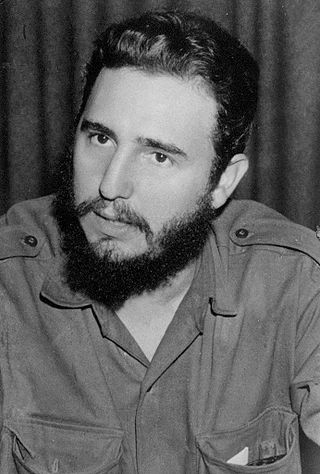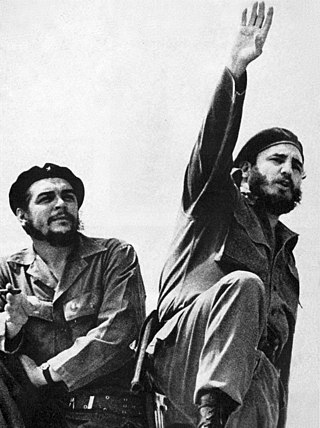
Fidel Alejandro Castro Ruz was a Cuban revolutionary and politician who was the leader of Cuba from 1959 to 2008, serving as the prime minister of Cuba from 1959 to 1976 and president from 1976 to 2008. Ideologically a Marxist–Leninist and Cuban nationalist, he also served as the first secretary of the Communist Party of Cuba from 1961 until 2011. Under his administration, Cuba became a one-party communist state; industry and business were nationalized, and socialist reforms were implemented throughout society.
Comandante is a political documentary film by American director Oliver Stone. In the film, Stone interviews Cuban leader Fidel Castro on a diverse range of topics. Stone and his film crew visited Castro in Cuba for three days in 2002, and the film was released in 2003, having its premiere at the Sundance Film Festival early that year. The film was partly produced by HBO and was planned for broadcast. Shortly before airtime, after Cuba executed three hijackers of a ferry to the United States and imprisoned more than 70 political dissidents, HBO pulled the program. To this day, it still has not been given a video release in the USA.

Alberto Díaz Gutiérrez, better known as Alberto Korda or simply Korda, was a Cuban photographer, remembered for his famous image Guerrillero Heroico of Argentine Marxist revolutionary Che Guevara.

The Cuban dissident movement is a political movement in Cuba whose aim is to replace the current government with a liberal democracy. According to Human Rights Watch, the Marxist-Leninist Cuban government represses nearly all forms of political dissent.

Saul Landau was an American journalist, filmmaker and commentator. He was also a professor emeritus at California State Polytechnic University, Pomona, where he taught history and digital media.
Fidel most commonly refers to:
Surplus: Terrorized Into Being Consumers is a 2003 Swedish documentary film on consumerism and globalization, created by director Erik Gandini and editor Johan Söderberg. It looks at the arguments for capitalism and technology, such as greater efficiency, more time and less work, and argues that these are not being fulfilled, and they never will be. The film leans towards anarcho-primitivist ideology and argues for 'a simple and fulfilling life'.

Pedro Luis Boitel was a Cuban poet and dissident who opposed the governments of both Fulgencio Batista and Fidel Castro. In 1961, he was sentenced to 10 years in prison.

638 Ways to Kill Castro is a Channel 4 documentary film, broadcast in the United Kingdom on 28 November 2006, which tells the story of some of the numerous attempts of the Central Intelligence Agency to kill Cuba's leader Fidel Castro. It was directed by Dollan Cannell.

Jon Alpert is an American journalist and documentary filmmaker, known for his use of a cinéma vérité approach in his films.
Nicolás Guillén Landrián was a Cuban experimental filmmaker and painter.
Héctor Fernando Maseda Gutiérrez is a Cuban nuclear engineer and a journalist.
Fidel Suárez Cruz is a Cuban farmer from Pinar del Río.
Pier 5, Havana is a 1959 American Neo-noir, action, adventure, mystery, thriller crime film directed by Edward L. Cahn starring Cameron Mitchell and Allison Hayes.
Waiting for Fidel is a Canadian documentary by Michael Rubbo and starring director Rubbo, former Premier of Newfoundland and Labrador Joey Smallwood and Newfoundland media mogul Geoff Stirling. It depicts Rubbo, Smallwood, and Stirling's unsuccessful attempt to interview Cuban leader Fidel Castro.
José Conrado Rodríguez Alegre, a Cuban priest from the parish of Santa Teresita del Niño Jesús, in Santiago de Cuba, is best known for his strongly worded open letter in 2009 to Cuban President Raúl Castro. The letter condemns what Conrado says are the social problems, the restrictions on liberty and the increasing threats and interrogations that have been directed at his parishioners. Conrado had written a similar open letter to Fidel Castro in 1994.

Gianni Minà was an Italian journalist, writer, magazine editor, and television host. He collaborated with both Italian and International newspapers and magazines; produced hundreds of reports for RAI ; conceived and hosted television programs, as well as produced successful documentary films on the lives of Che Guevara, Muhammad Ali, Fidel Castro, Rigoberta Menchú, Silvia Baraldini, Subcomandante Marcos and Diego Maradona.

Eloy Gutiérrez Menoyo was a revolutionary who led the guerrilla force Second National Front of Escambray during the Cuban Revolution against Fulgencio Batista and later opposed the government of Fidel Castro over its pro-Soviet leanings. His brother Carlos Gutíerrez Menoyo died in the Presidential Palace attack of March 13, 1957.
Carlos Marcovich is a director, editor, photographer and producer of Mexican cinema. Born in Buenos Aires, Argentina, he came with his family to Mexico on April 1, 1976. In 2011 he became a naturalized Mexican.

The consolidation of the Cuban Revolution is a period in Cuban history typically defined as starting in the aftermath of the revolution in 1959 and ending in the first congress of the Communist Party of Cuba 1975, which signified the final political solidification of the Cuban revolutionaries' new government. The period encompasses early domestic reforms, human rights violations continuing under the new regime, growing international tensions, and politically climaxed with the failure of the 1970 sugar harvest.









